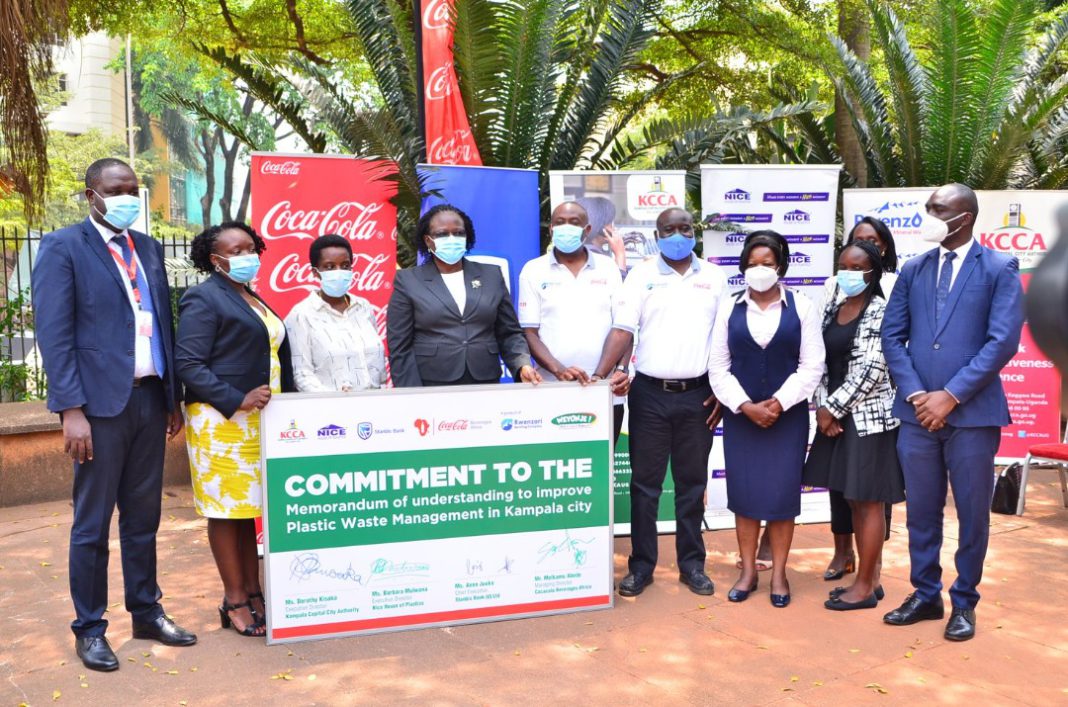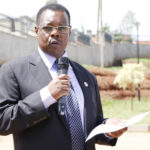Stanbic Bank, Kampala City Council Authority (KCCA), Coca-Cola Beverages Africa in Uganda and Nice House of Plastics have memorandum of Understanding (MOU) to promote responsible use and recycling of plastic waste and sustainable environmental protection.
The three companies together with KCCA agreed to support various waste management initiatives in communities and help plastic waste collection centers increase their capacity to collect, safely dispose and recycle plastic waste.
Studies estimate that in Uganda, an average of 1,500 tonnes of plastic waste are generated daily, with only 500 tonnes properly managed. This indicates a collection efficiency of 30%, implying that most of the waste generated is not safely recycled and goes into the environment.
Stanbic Bank’s Executive Director and Head of Corporate & Investment Banking, Emma Mugisha said the collaboration would bring together various private sector players to promote sustainable recycling of plastics through an eco-system underpinned by value addition to create end products and ultimately protect the environment.
“As part of the collaboration, Stanbic Bank will be providing financial support and advisory services needed to achieve sustainable waste management. We are proud to be part of this initiative as it’s aligned to SEE priorities that seek to address the Social, Economic and Environmental needs of the people we serve,” Emma said.
She added; “Being great advocates of the UN Sustainable Development Goal, the Bank aims at doing business the right way which means being aware of the indirect impact of our actions onto the societies we operate and future generation. If we want to preserve our environment we operate in, the time to act is now.”
Coca-Cola Beverages Africa Public Affairs and Communications Director, Simon Kaheru, said the beverages firm was a committed leader in developing sustainable ways to manufacture, distribute and sell soft drinks while protecting the environment through pro-active recycling.
“We believe in doing business the right way – and insist on this throughout our value chain. Plastic Recycling Industries is an initiative under which we fund the collection and delivery of plastic waste from the environment and recycle it into raw materials that can be put to end use manufacture. This collaboration is an important step in the journey we are on to achieve 100% collection and recycling of the products our consumers buy,” Kaheru said.
Kaheru added that Coca-Cola globally pledged that by 2030 the company would redesign packaging to make it more recyclable, and help collect and recycle 100% of the plastic waste generated through its business.
“Forming collaborations such as this landmark partnership we have signed on today is an integral part of that pledge. Bringing people together to actually do the work or encourage more individuals and companies out there to also do business the right way is a big step in changing our world. First, we change ourselves, then we change other people,” he said.
In the collaboration, Coca-Cola Beverages Africa’s Plastic Recycling Industries will collect PET bottles from the environment through a system of collection partners countrywide, recycle them into PET Flakes and then supply them as raw materials for Nice House of Plastics to create finished products.
Barbara Mulwana, Executive Director of Nice House of Plastics, said the plastics manufacturer will use the PET flakes to make final products such Yarn-Fibre, Wood Plastic Composite and PET.
“Recycled PET is one of the major raw materials that we use in our work. We have previously imported some of it and this collaboration will go a long way in solving our raw material problem and promoting a safe environment,” she said.
The Kampala Capital City Authority Executive Director, Dorothy Kisaka, thanked the companies for technically and financially supporting KCCA in its effort to safely dispose of plastic waste.
“We are grateful that you have officially joined hands with us once again, in another form, to supplement our efforts to clean up the city and make our environment better. Kampala City and the Greater Kampala Metropolitan Area are supposed to be green – providing a sustainable plastic waste recycling infrastructure is an essential qualification of that ‘green-ness’,” she said.
“Waste management is a key component for achieving a sustainable safe environment. Together, we shall be able to create an ecosystem that guarantees the continued survival of nature as well as provide a market for valued added recycled plastics that can be locally consumed,” Kisaka added.








